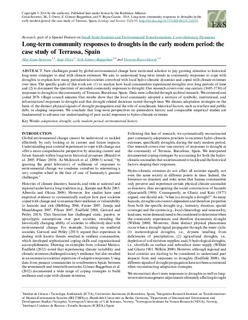Long-term community responses to droughts in the early modern period: the case study of Terrassa, Spain
Peer reviewed, Journal article
Permanent lenke
http://hdl.handle.net/11250/2392038Utgivelsesdato
2016Metadata
Vis full innførselSamlinger
- Publikasjoner fra CRIStin - NINA [2364]
- Scientific publications [1392]
Sammendrag
New challenges posed by global environmental change have motivated scholars to pay growing attention to historical long-term strategies to deal with climate extremes. We aim to understand long-term trends in community responses to cope with droughts, to explain how many preindustrial societies coevolved with local hydro-climatic dynamics and coped with climate extremes over time. The specific goals of this work are: (1) to analyze how local communities experienced droughts over long periods of time and (2) to document the spectrum of recorded community responses to drought. Our research covers over one century (1605-1710) of responses to drought in the community of Terrassa, Barcelona, Spain. Data were collected through archival research. We reviewed and coded 2076 village council minutes. Our results show that the local community adopted a mixture of symbolic, institutional, and infrastructural responses to drought and that drought-related decisions varied through time. We discuss adaptation strategies on the basis of the distinct physical signals of drought propagation and the role of nonclimatic historical factors, such as warfare and public debt, in shaping responses. We conclude that long-term perspectives on premodern history and comparable empirical studies are fundamental to advance our understanding of past social responses to hydro-climatic extremes.
adaptation; drought; early modern period; environmental history
